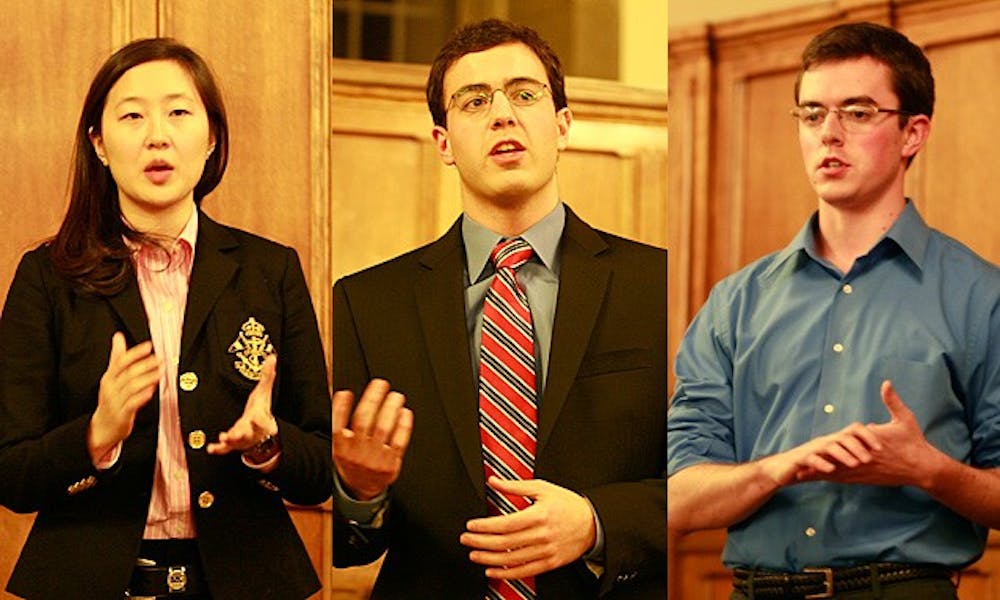Finalists for the undergraduate Young Trustee position gathered for the second annual Young Trustee public debate Thursday night.
Seniors Matt Davis, Ben Getson and Michelle Sohn discussed their backgrounds, University experiences and the role of the Young Trustee before a group of about 40 students in the Great Hall. The finalists answered questions from moderator Will Robinson, a senior, chair of The Chronicle’s independent Editorial Board, former editor of The Chronicle and former president of the Duke Student Publishing Company.
In their opening statements, all three candidates emphasized their institutional knowledge and love for Duke.
“Duke has really provided me a home of opportunity, and it’s also the place that challenges me the most,” Sohn said. “I’m really running for the concept of home and making sure Duke doesn’t fall short when it comes to students of different backgrounds.”
The candidates answered nine questions during the debate relating to their qualifications for the position and present University concerns.
The three candidates also highlighted their leadership roles on campus—Davis as the undergraduate student representative on the Duke Student Publishing Company’s Board of Directors, Getson as the undergraduate student representative on the search committee for the dean of the Trinity College of Arts and Sciences and Sohn as a member of the Board of Trustees’ Undergraduate Education Committee.
“I understand how to communicate with Trustees,” Getson said. “Ultimately, my experience and ability to communicate well and frame the discussion in terms of the strategic plan and mission is how I will be able to accomplish the role of the Young Trustee.”
The Kunshan, China campus, financial limitations and Duke’s reputation took center stage in the debate, with the finalists agreeing on most issues. All three candidates highlighted Kunshan as a tool to improve Duke’s reputation and foster international collaboration.
“[Kunshan] creates an opportunity for collaboration whether it’s directly sending students there or bringing students here,” Davis said. “The world is getting flat, and Duke needs to stay on cutting edge.... With higher education changes in the coming years, we need to be aware that globalization is part of that change.”
With regard to budget cuts, the candidates agreed that Duke should protect the student experience. Davis recommended “the right cuts” and Getson encouraged the University to hire interdisciplinary faculty to strengthen the academic experience and save money. Sohn emphasized the value of student-driven initiatives like house courses and entrepreneurial ventures, which she believes lead to “organic student academic engagement.”
When it came to Duke’s reputation, the candidates had different views on how the Board should confront issues like Tailgate and the scandalous PowerPoint presentation created by Karen Owen, Trinity ’10.
Getson recommended the Board concentrate on academic excellence across all of its departments in hopes that achievement will eclipse bad press. Sohn suggested that the Board investigate the causes of these issues by examining Duke’s sexual and socioeconomic culture. Davis agreed that positive press would lessen the impact of occasional scandals but did not rule out the possibility of a campus culture initiative.
“Ultimately... if we focus on what we do well, what we do better than any other peer institution, than the good media will follow because we’ll become a leader,” Getson said. “If we focus on [our] resources and then build them up as a part of the curriculum so that Duke becomes a leader in interdisciplinary education... then we make a name for ourselves, and it’s not a name that is going to be associated with sex, scandal, Karen Owen or Tailgate.”
All candidates defended the annual $14.6 million subsidy provided to Duke Athletics. Sohn spoke highly of the student-athlete experience, Davis encouraged smart budget cuts within Athletics and Getson drew a connection between successful sports programs and alumni relations and donations. The finalists also commended the ability of Duke’s athletics to unify students of different backgrounds.
“Duke Athletics definitely deserves the subsidy, first because it builds school spirit and unity across different backgrounds and diverse experiences,” Sohn said. “Second, one of the strong points of the Duke experience is the student-athlete experience.... All student athletes get the opportunity to participate in this great leadership program from freshman year to senior year.”
When asked about the most important issues that would face the Board next year, the candidates agreed on little other than the primacy of Kunshan’s campus.
Sohn suggested smoothing the transition to the house model and reviewing the socioeconomic and women’s initiatives. Davis suggested maximizing the effectiveness of Duke’s best academic programs and passing a balanced budget. Getson advocated for the defense and expansion of social space and equal undergraduate access to campus resources, such as advising.
Although they were not allowed to participate in the debate, write-in candidates Brooke Kingsland and Chris Martin, both seniors, were in attendance. The Board of Elections prohibited write-in candidates from participating because the bylaws do not explicitly permit it.
Get The Chronicle straight to your inbox
Signup for our weekly newsletter. Cancel at any time.

